Best Dog Bed for A Chihuahua
Chihuahua’s Need A Comfortable Dog Bed!
Introduction
The best dog for a Chihuahua takes into account their sleeping position, health issues, and preferences. Orthopedic bolster beds make the best choice. Chihuahuas, known for their tiny size and big personalities, are one of the most beloved small dog breeds in the world.
Despite their petite stature, these dogs have a lot of energy, confidence, and loyalty packed into their little frames. Originating from Mexico, the Chihuahua is one of the oldest dog breeds in the Americas, often recognized for its apple-shaped head, large expressive eyes, and prominent ears.
Their small size makes them ideal for apartment living, and they are easily portable, which makes them popular companions for people who are always on the go. Chihuahuas have distinct personality traits that set them apart from other small breeds.
They can be bold, alert, and fiercely loyal, often forming strong bonds with their owners. This breed thrives on attention and affection, and they love being at the center of family life. However, their protectiveness can sometimes make them wary of strangers, and they can be a bit vocal if not properly trained.
While Chihuahuas have relatively few physical needs compared to larger breeds, their owners must be mindful of their specific care requirements, including their susceptibility to cold, dental health, and delicate bones.
Understanding their unique behaviors and health needs is essential for providing the best care and ensuring a long, healthy life for these tiny companions. Whether you’re a first-time dog owner or a seasoned dog lover, Chihuahuas are a breed that will quickly steal your heart with their charm, intelligence, and spunky attitude.
In this guide, we will cover the best beds and brands, health issues, behavior concerns, tips for new owners, costs of ownership, and safe foods and foods to avoid. With this information potential new owners should know about Chihuahuas to determine if they want one of their own.
Best Dog Beds
For Chihuahuas, the best dog beds should prioritize comfort, warmth, and support due to their small size and sensitivity to cold. Here’s a list of recommended bed types:
- Bolster Beds: These beds have raised edges or sides, providing Chihuahuas a sense of security while offering a cozy spot to curl up.
- Cave or Hooded Beds: Since Chihuahuas love to burrow and stay warm, cave or hooded beds, with a covered top, allow them to snuggle in and feel protected.
- Memory Foam Beds: For extra comfort and joint support, memory foam beds are ideal, especially for older Chihuahuas or those with joint issues.
- Heated Beds: Because of their sensitivity to cold, heated beds can help keep Chihuahuas warm and comfortable during cooler months or in air-conditioned homes.
- Donut or Nest Beds: These round, plush beds with high, soft sides are perfect for Chihuahuas who like to snuggle and feel surrounded by softness.
- Self-Warming Beds: These beds are made from materials that reflect the dog’s body heat, providing warmth without the need for electricity—great for Chihuahuas in cooler climates.
- Orthopedic Beds: Ideal for aging or senior Chihuahuas, orthopedic beds provide extra cushioning and support, helping relieve pressure on their joints. When purchasing any bed made with memory foam, be sure to look for the CertiPUR-US seal. The seal means that the materials used do not contain any toxins or chemicals that are harmful to humans and pets.
- Travel Beds: Lightweight and portable beds are perfect for Chihuahuas since they often accompany their owners on trips. These beds can be easily folded for transport while offering comfort on the go.
These bed options ensure Chihuahuas have a cozy, supportive, and warm resting spot.
Best Brands
Here are some of the best dog bed brands to consider:
- Furhaven: Known for a variety of styles, including orthopedic, bolster, and cave beds, Furhaven offers comfortable options that provide joint support and security for small breeds like Chihuahuas.
- Best Friends by Sheri: Their popular Donut Cuddler bed is perfect for Chihuahuas, offering a cozy, plush, round design that allows them to snuggle in and feel safe.
- K&H Pet Products: They offer excellent heated and self-warming beds, ideal for Chihuahuas who are sensitive to the cold. The Thermo-Snuggly Sleeper is a top choice for keeping small dogs warm.
- PetFusion: This brand is known for durable and supportive orthopedic beds that offer great comfort for small dogs with joint issues. The PetFusion Ultimate Lounge is a great option.
- Snoozer: Their Luxury Cozy Cave bed is ideal for Chihuahuas who love to burrow. It provides warmth and security, making it a favorite among small dog owners.
- Brindle: Specializing in memory foam and orthopedic beds, Brindle’s beds offer support and comfort, particularly for older or arthritic Chihuahuas.
- BarksBar: Offering quality orthopedic beds with bolsters, BarksBar provides great comfort and durability for small dogs that need support and a sense of security.
- Majestic Pet: This brand is known for stylish yet practical beds, with plenty of options for bolster and donut-style beds that small dogs enjoy.
- MidWest Homes for Pets: Their Bolster Pet Bed is simple, affordable, and fits well in crates or as a standalone bed, providing comfort for small dogs like Chihuahuas.
- Blueberry Pet: Offering both stylish and functional beds, Blueberry Pet’s beds are durable and come in various styles, including cozy bolster and lounge beds.
These brands offer a range of designs to suit the comfort and warmth needs of Chihuahuas.
Facts & Fun Facts
Here are some facts about Chihuahuas for potential new owners:
Measurements:
- Height: 5 – 8 inches
- Weight Males: 6 – 8 lbs.
- Weight Females: 5 – 7 lbs.
- Length: 9.5 – 15 inches
- Lifespan: 14 – 16 years
- Fully Grown: 9 – 10 months
- Colors: Black, Black & Tan, Blue & Tan, Chocolate, Chocolate & Tan, Cream, Fawn, Fawn & White, Red
- Popularity: This dog breed is the 32nd most popular breed in the United States according to the American Kennel Club.
- Intelligence: This dog is the 67th most intelligent out of 130 breeds according to Professor Stanley Coren from the University of British Columbia.
Facts
- The AKC Recognized the Breed in 1904: The AKC ushered the Chihuahua into the ranks of its recognized breeds in 1904. The Chihuahua Club of America was created in 1923, and its ranks included many notable figures in the dog world.
- The Breed Rose to Popularity in the U.S. in the 1800s: Chihuahuas, many of them long-haired, caught the eye of American dog breeders in the 19th century. Foundation stock was also imported around this time. One important dog was Caranza, brought to the U.S. by author Owen Wiser. Caranza’s lineage produced two major Chihuahua bloodlines, called Meron and Perrito.
- Small but Mighty: Chihuahuas are one of the smallest dog breeds, typically weighing between 2-6 pounds, but they have big personalities and are known for their confidence.
- Loyal Companions: They form strong bonds with their owners and can be very protective, making them excellent watchdogs despite their size.
- Coat Types: Chihuahuas come in two coat varieties—smooth (short-haired) and long-haired. Both types require grooming, with long-haired Chihuahuas needing more brushing to prevent matting.
- Exercise Needs: Though small, they are energetic and enjoy short walks and playtime. They don’t need as much exercise as larger breeds, making them great for apartment living.
- Cold Sensitivity: Due to their size, Chihuahuas are sensitive to cold weather. Many owners dress their Chihuahuas in sweaters during colder months.
- Training: Early socialization and training are crucial for Chihuahuas, as they can be stubborn. Consistency and positive reinforcement work best with this breed.
- Fragile Physique: Their small size makes them delicate, especially around children or larger pets, so gentle handling is important.
- Health Concerns: Common health issues include dental problems, hypoglycemia, and patellar luxation. Regular vet check-ups are key to keeping them healthy.
- Great Travelers: Their small size makes Chihuahuas easy to transport, and they often enjoy being carried around or riding in a pet carrier.
Fun Facts
Here are some fun facts about Chihuahuas that many people might not know:
- Ancient Roots: Chihuahuas are believed to have descended from a breed called the Techichi, which was kept by the ancient Toltec civilization in Mexico.
- Big Brain, Tiny Body: Chihuahuas have the largest brain-to-body ratio of any dog breed, making them quite intelligent for their size!
- Taco Bell Fame: Chihuahuas gained international fame in the 1990s thanks to the Taco Bell advertising campaign featuring a Chihuahua that became a pop culture icon.
- Apple Head vs. Deer Head: There are two different head shapes in Chihuahuas—apple head (rounded skull, more common) and deer head (longer snout, less common).
- Royal Connections: Emperor Montezuma of the Aztec Empire is said to have kept Chihuahuas in his palace, making them a breed with royal lineage.
- Born in Pairs: Chihuahuas tend to have smaller litters compared to other breeds, with one or two puppies being the norm, although larger litters can happen.
- Space Lovers: Chihuahuas have been featured in space-related fun, including dressing up as astronauts or space dogs at events and in TV shows.
- Super-Fast!: Despite their tiny legs, Chihuahuas can run at surprising speeds for short distances and are known for their quick reflexes and agility.
- Vocal Dogs: Chihuahuas are known for their barking and can sometimes sound off if they feel they need to alert their owners. This makes them excellent “alarm” dogs.
Common Health Issues
Here are some of the most common health conditions Chihuahuas may face:
- Patellar Luxation: This is a common condition in small breeds where the kneecap dislocates or moves out of place, causing discomfort and potential mobility issues.
- Dental Problems: Due to their small mouths, Chihuahuas are prone to dental issues like gum disease, tooth decay, and overcrowding. Regular dental care is essential.
- Hypoglycemia: Low blood sugar is a common issue in young Chihuahuas, especially puppies. Symptoms include lethargy, weakness, and seizures. Regular, small meals can help prevent this.
- Heart Disease: Chihuahuas are prone to heart conditions, including mitral valve disease, which can lead to heart failure if not managed properly. Routine vet check-ups can catch early signs.
- Collapsing Trachea: This condition causes the trachea (windpipe) to collapse, leading to difficulty breathing, coughing, and wheezing. It’s more common in small breeds like Chihuahuas.
- Obesity: Despite their small size, Chihuahuas can gain weight easily, which can put strain on their joints and exacerbate other health conditions like heart disease and diabetes.
- Hydrocephalus: This is a condition where excess fluid accumulates in the brain, leading to pressure and developmental issues. It is sometimes seen in puppies and young Chihuahuas.
- Eye Problems: Chihuahuas are prone to several eye issues, including corneal ulcers, dry eye, and progressive retinal atrophy (PRA), which can lead to vision loss over time.
- Open Fontanel (Molera): Some Chihuahuas are born with a soft spot on their skull called a molera. While it usually closes as they age, in some cases, it remains open, leaving the dog vulnerable to head injuries.
- Reverse Sneezing: This is a common, harmless condition in Chihuahuas that occurs when the dog rapidly pulls air in through the nose, often mistaken for choking or difficulty breathing.
Regular vet visits, proper nutrition, and weight management can help mitigate some of these conditions, ensuring a healthy life for Chihuahuas.
Behavior Issues
Here are some Chihuahua behaviors that new owners should be aware of:
- Big Dog Attitude: Despite their small size, Chihuahuas often display a “big dog” attitude. They are fearless and can be assertive, especially around larger dogs. This can lead to “small dog syndrome” if not properly managed.
- Protectiveness: Chihuahuas tend to bond closely with one person and may become very protective of their favorite human. They can be wary of strangers and may bark or act defensively when they perceive a threat.
- Burrowing Instinct: Chihuahuas love to burrow under blankets or cushions. This is an instinctual behavior related to their desire for warmth and comfort. Owners should be cautious when sitting on furniture to avoid accidentally sitting on a burrowed Chihuahua.
- Separation Anxiety: Chihuahuas can develop separation anxiety if left alone for long periods. They thrive on human companionship and may exhibit anxious behaviors like barking, whining, or destructive chewing when their owners are away.
- Vocal and Barking: Chihuahuas are known for being vocal and can be frequent barkers. They often bark at noises, strangers, or even to get attention. Early training can help manage excessive barking.
- Stubbornness: Chihuahuas can be quite stubborn and independent, making training a bit challenging. Consistent, positive reinforcement is essential to overcome this trait.
- Clingy Behavior: Many Chihuahuas love being with their owners at all times and can be quite clingy. They enjoy being held or sitting on laps and may follow their owners from room to room.
- Trembling: It’s common for Chihuahuas to tremble or shiver, even when they’re not cold. This can happen due to excitement, anxiety, or fear. Owners should learn to distinguish between normal trembling and signs of stress or discomfort.
- Selective Socializing: Chihuahuas can be selective when it comes to socializing with other dogs or people. They tend to prefer the company of other Chihuahuas or small dogs and may be cautious around larger breeds or unfamiliar people.
- Energetic Bursts: While Chihuahuas don’t need excessive exercise, they do experience short bursts of high energy. These playful moments, known as “zoomies,” involve them running around energetically for a few minutes before settling down again.
Understanding these behaviors can help new owners better manage their Chihuahua’s needs and ensure a happy, well-adjusted pet.
Tips for New Owners
Here are some helpful tips for new Chihuahua owners:
- Start Training Early: Chihuahuas can be stubborn and independent, so it’s important to start training and socialization as early as possible. Use positive reinforcement techniques like treats and praise to encourage good behavior.
- Socialize Carefully: Chihuahuas tend to be cautious around new people and larger dogs. Introduce them to different environments, people, and other pets in a controlled, positive manner to prevent fear-based aggression.
- Watch Their Diet: Due to their small size, it’s easy to overfeed Chihuahuas, which can lead to obesity. Feed them a balanced, high-quality diet and monitor their portions carefully to avoid weight gain and related health issues.
- Provide Warmth: Chihuahuas are sensitive to cold due to their small size and thin coats. Make sure they have warm blankets, sweaters during colder months, and cozy beds to keep them comfortable.
- Dental Care Is Crucial: Chihuahuas are prone to dental problems, so regular dental care is a must. Brush their teeth frequently, offer dental treats or toys, and schedule regular vet check-ups to keep their teeth and gums healthy.
- Limit Jumping and High Places: Chihuahuas have fragile bones and joints. Avoid letting them jump off furniture or climb too high to prevent injuries like broken bones or sprains.
- Exercise in Moderation: While Chihuahuas are energetic, they don’t need extensive exercise. Short daily walks and indoor playtime are usually enough. Make sure they don’t overexert themselves, especially in hot weather.
- Handle Them Gently: Chihuahuas are small and delicate, so handle them with care. Teach young children how to be gentle and avoid rough play to prevent accidental injuries.
- Regular Vet Visits: Schedule regular vet check-ups to monitor for common health issues like dental disease, heart conditions, and patellar luxation. Early detection is key to maintaining their health.
- Use a Harness, not a Collar: Chihuahuas are prone to collapsing trachea, so it’s safer to use a harness instead of a collar for walks to prevent pressure on their neck.
- Monitor for Hypoglycemia: Especially in puppies, keep an eye on their blood sugar levels. If your Chihuahua seems lethargic, weak, or disoriented, offer a small amount of sugar or honey and consult a vet.
- Be Patient with Potty Training: Chihuahuas can be slow to potty train due to their small bladder size. Patience and consistency are key and consider using pee pads or a designated indoor spot during training.
These tips will help new owners understand how to care for their Chihuahua and ensure a healthy, happy relationship with their new pet.
Costs of Ownership
The average cost of owning a Chihuahua can vary based on factors like location, care needs, and lifestyle. Here’s a breakdown of some typical costs new owners can expect:
1. Initial Costs
- Adoption or Purchase:
- Adoption from a shelter: $50–$300
- Buying from a breeder: $500–$2,500 (depending on lineage, breeder reputation, and location)
- Initial Supplies:
- Bed, toys, food/water bowls, leash, harness, etc.: $100–$300
- Spaying/Neutering:
- $200–$500 (if not included in adoption fee)
- First Vet Visit (vaccinations, initial health check, microchip):
- $100–$300
2. Annual Costs
- Food:
- Chihuahuas are small eaters, so food costs are relatively low: $150–$300 per year
- Routine Vet Care (check-ups, vaccinations, heartworm prevention, flea/tick medication):
- $300–$600 per year
- Grooming:
- Depending on the coat type, grooming can cost $30–$50 per session, or around $200–$400 annually for regular grooming visits.
- Dental Care:
- Professional cleaning: $200–$500 annually (due to Chihuahuas’ tendency toward dental problems)
- Pet Insurance:
- $250–$600 per year, depending on coverage
- Toys and Treats:
- $50–$150 per year
3. Other Potential Costs
- Training Classes:
- $100–$300 for basic obedience training, if needed
- Emergency Vet Visits:
- Costs can range from $500 to $3,000+ depending on the severity of the issue.
- Pet Sitting/Boarding:
- $20–$50 per day for pet sitting or boarding when you travel
- Clothing and Accessories:
- Since Chihuahuas are prone to cold, many owners invest in sweaters or jackets: $20–$100 per year.
Total Estimated Costs:
- First Year: $1,000–$3,500 (including initial setup, supplies, and vet care)
- Subsequent Years: $500–$1,500 annually for ongoing care
These estimates can fluctuate based on individual needs, but they give a good general idea of the financial commitment involved in Chihuahua ownership.
Safe Foods & Foods To Avoid
Here are some safe and unsafe foods for Chihuahuas:
Safe Foods for Chihuahuas:
- Lean Meats: Chicken, turkey, beef, and lamb (cooked, boneless, and skinless) are excellent protein sources.
- Carrots: Raw or cooked carrots are a great low-calorie snack and good for their teeth.
- Blueberries: Rich in antioxidants and vitamins, blueberries are safe in moderation.
- Pumpkin: Plain, cooked pumpkin can help with digestion and is safe in small amounts.
- Apples: Apples (without seeds or core) are high in fiber and vitamins A and C.
- Peanut Butter: Unsweetened, natural peanut butter is a tasty treat in moderation.
- Green Beans: Steamed or raw, green beans are low-calorie and full of fiber and vitamins.
- Sweet Potatoes: Cooked, plain sweet potatoes are a healthy, nutrient-rich food.
- Rice: Plain, cooked rice is gentle on the stomach and can be given with lean meats.
- Eggs: Cooked eggs are a great source of protein and safe for Chihuahuas.
Foods to Avoid for Chihuahuas:
- Chocolate: Contains theobromine, which is toxic to dogs and can cause vomiting, seizures, or even death.
- Grapes and Raisins: These can cause kidney failure in dogs, even in small amounts.
- Onions and Garlic: Both can damage a dog’s red blood cells, leading to anemia.
- Avocados: Avocados contain persin, which can be toxic to dogs, especially in large amounts.
- Caffeine: Coffee, tea, or anything with caffeine can lead to rapid heart rate, tremors, and other serious issues.
- Alcohol: Even small amounts can cause severe reactions like vomiting, coordination issues, and breathing problems.
- Macadamia Nuts: These nuts are toxic to dogs and can cause weakness, vomiting, and tremors.
- Artificial Sweeteners (Xylitol): Xylitol, often found in sugar-free gum and candy, can cause a dangerous drop in blood sugar and liver failure.
- Fatty Foods: Foods high in fat, like bacon or fried items, can lead to pancreatitis.
- Raw Dough: Yeast in dough can expand in the stomach, causing bloating or even life-threatening issues.
Offering healthy, safe foods while avoiding these dangerous items will help keep a Chihuahua happy and healthy.
Conclusion
Owning a Chihuahua is a rewarding experience filled with love, loyalty, and entertainment. Despite their small size, Chihuahuas have big hearts and vibrant personalities that bring joy to any household.
They form strong attachments to their owners and often display their affection through protective behavior and a desire for constant companionship. While they may sometimes act like “big dogs in a small body,” their spirited nature is part of what makes them so endearing.
Caring for a Chihuahua requires understanding their unique needs. Their sensitivity to cold means that extra attention should be given to keeping them warm and comfortable, especially in cooler climates.
Dental health is crucial, as Chihuahuas are prone to dental issues due to their small mouths. Regular brushing and dental check-ups will go a long way in preventing long-term problems.
Additionally, their small bones and joints mean that gentle handling is essential, as they are more susceptible to injury. When it comes to training and behavior, patience and consistency are key.
Early socialization and training will help your Chihuahua become well-adjusted and prevent undesirable behaviors like excessive barking or anxiety. They are intelligent dogs, so with positive reinforcement, they can quickly learn commands and tricks.
New owners should also be aware of their susceptibility to common health conditions, such as patellar luxation, heart disease, and hypoglycemia. Routine vet visits and a healthy diet are important to keeping them in good condition.
Overall, Chihuahuas make loving, loyal, and lively companions. With proper care, they can live long, happy lives, bringing joy and warmth to their owners for many years.
You can read about the other dog breed information articles by clicking HERE!
Shop Dog Beds
Shop dog beds for your dog by selecting or clicking on any bed of choice. You will be taken to Amazon where you can read customer reviews and answered questions and place the order.
As an Amazon Associate, I earn from qualifying purchases. Your purchase price is the same as if you shop directly on Amazon.
The price at time of publish is included below to give you an idea of what the price is; however, it is subject to change.
Cooling Gel Dog Beds
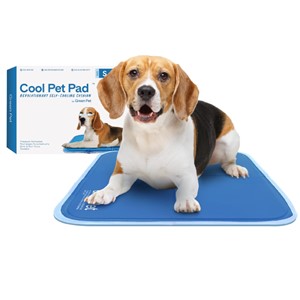
The Green Pet Shop Cooling Mat
Price At Time of Publish $40.00
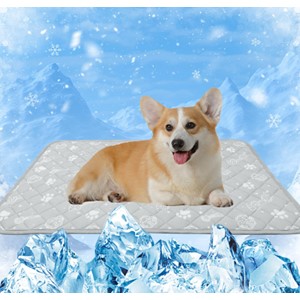
MH MYLUNE HOME Self Cooling Mat
Price At Time of Publish $40.00
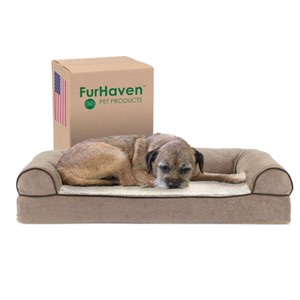
Furhaven Pet Products Cooling Gel Bolsters Small Bed
Price At Time of Publish $45.00
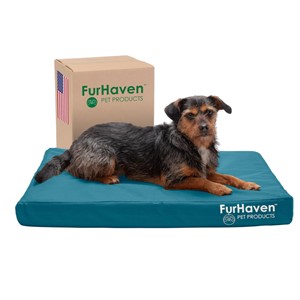
Furhaven Cooling Gel Medium Bed
Price At Time of Publish $42.00

ARF Pets Cooling Gel Pad
Price At Time of Publish $35.00
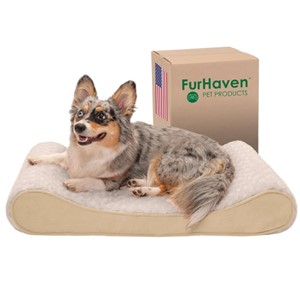
Furhaven Cooling Gel Small Bed
Price At Time of Publish $50.00
Price At Time of Publish $50.00
Orthopedic Dog Beds
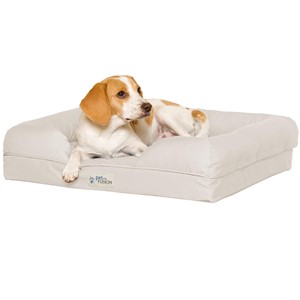
PetFusion Orthopedic Dod Bed
Price At Time of Publish $80.00
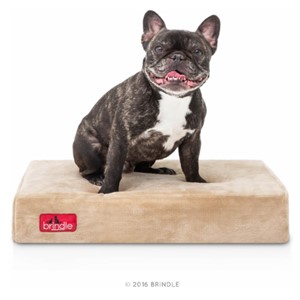
Brindle Orthopedic Bed Khaki
Price At Time of Publish $30.00
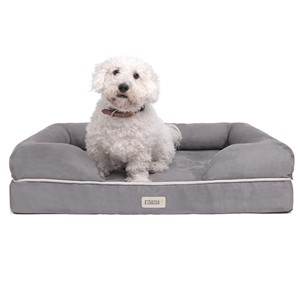
Friends Forever Orthopedic Bolster Bed
Price At Time of Publish $53.00
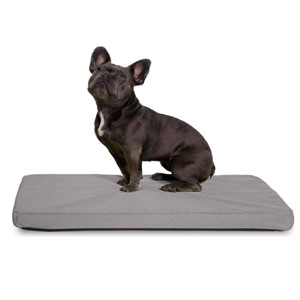
K9 Ballistics Tough Orthopedic Small Crate Bed
Price At Time of Publish $89.00
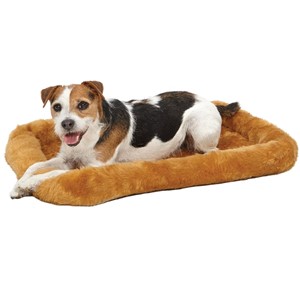
MidWest Homes Small Bolster Dog Bed
Price At Time of Publish $10.00
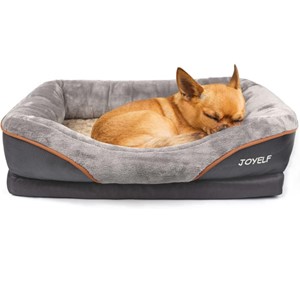
JOYELF Orthopedic Small Sofa Bed
Price At Time of Publish $40.00
Bolster Dog Beds
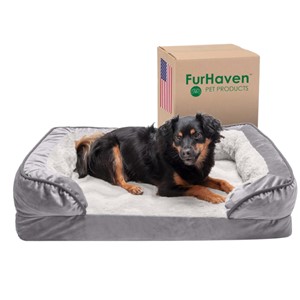
Furhaven Small-Medium Bolster Dog Bed
Price At Time of Publish $57.00
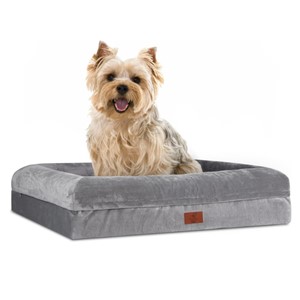
Yiruka Small Bolster Sofa Dog Bed
Price At Time of Publish $40.00
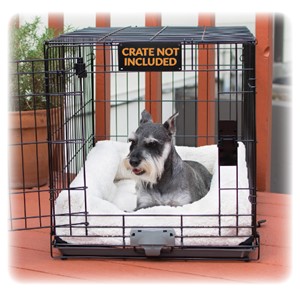
K&H Pet Products Bolster Crate Pad
Price At Time of Publish $22.00
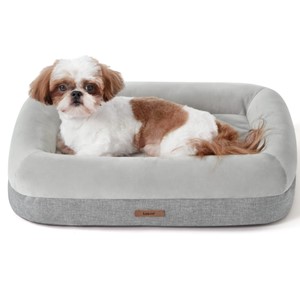
Leasure Small Bolster Dog Bed
Price At Time of Publish $40.00
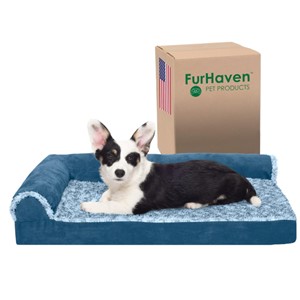
Furhaven Small-Medium L-Shaped Bed
Price At Time of Publish $39.00
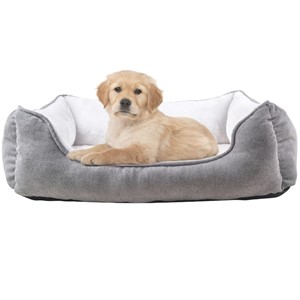
Long Rich Bolster Small Bed
Price At Time of Publish $27.00
Elevated Dog Beds
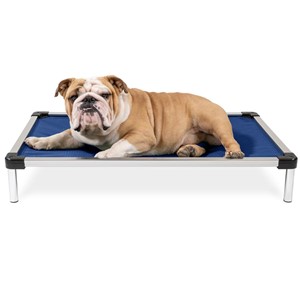
K9 Ballistics Chew Proof Elevated Small Bed
Price At Time of Publish $129.00
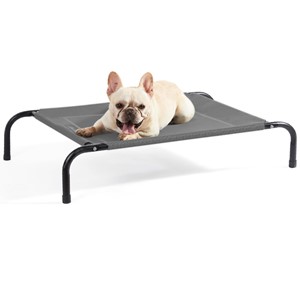
Bedsure Medium Elevated Dog Bed
Price At Time of Publish $33.00
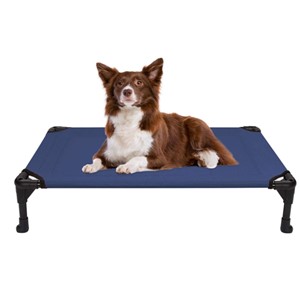
Veehoo Medium Elevated Dog Bed
Price At Time of Publish $45.00
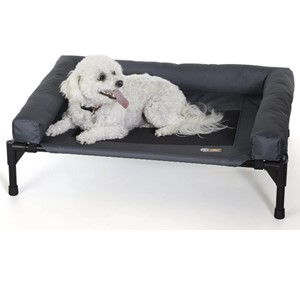
K&H Pet Products Elevated Bolster Dog Bed
Price At Time of Publish $57.00
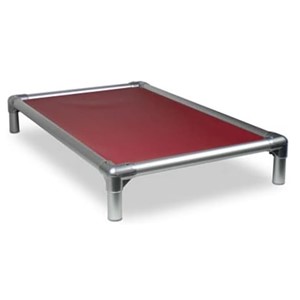
Kuranda Elevated Chew Proof Small Dog Bed
Price At Time of Publish $134.00
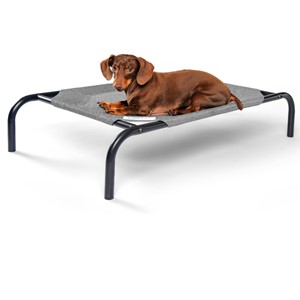
Coolaroo Small Elevated Dog Bed
Price At Time of Publish $21.00
Shop Cave/Donut Dog Beds
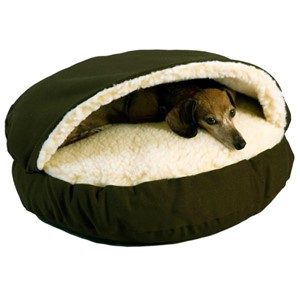
Snoozer Cozy Cave Bed
Price At Time of Publish $87.00
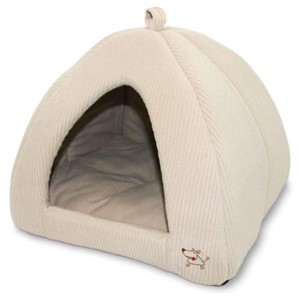
Best Pet Supplies Tent Bed
Price At Time of Publish $23.00
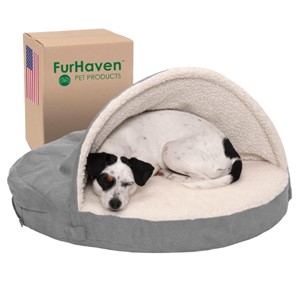
Furhaven Round Orthopedic Cave Bed
Price At Time of Publish $30.00
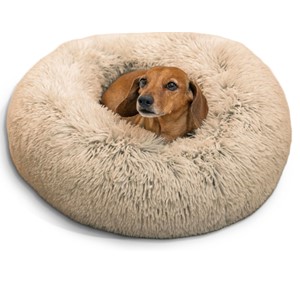
Best Friends by Sheri Original Calming Donut Bed
Price At Time of Publish $25.00
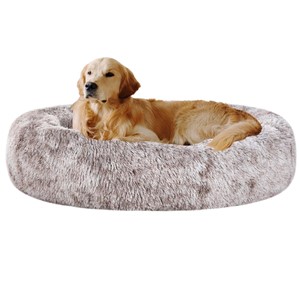
Coohom Oval Calming Donut Cuddler Bed
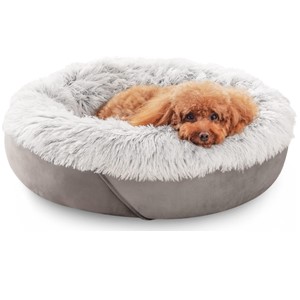
JOEJOY Calming Donut Small Dog Bed
Price At Time of Publish $33.00
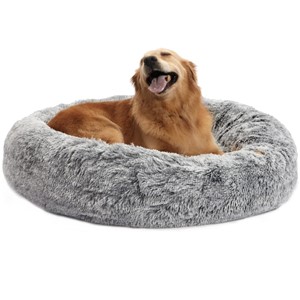
Bedfolks Calming Donut Dog Bed
Price At Time of Publish $66.00
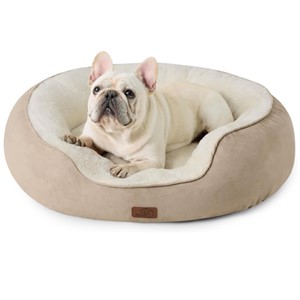
Bedsure Medium Donut Dog Bed
Price At Time of Publish $36.00

Bedsure Medium Donut Dog Bed
Price At Time of Publish $40.00
Related Articles
Below are some other articles you may be interested in reading. Just select on the topic of interest to learn more about it.
- Best Healthy Dog Food Brands
- Christmas Presents for My Dog
- Crates for Dogs
- Critical Signs Your Dog Needs Help
- Dog Training Techniques
- How To Train a Puppy
- Positive Reinforcement for Dog Training
- Puppy Proofing Your House
- Training Dog with Treats
- Using Alexa for Dog Behaviors
Go back to the Dog Luxury Beds home page.

